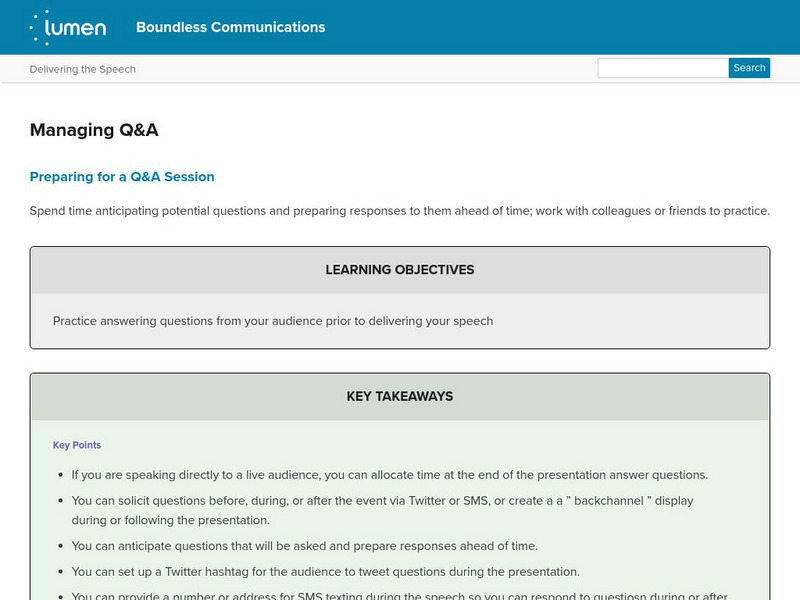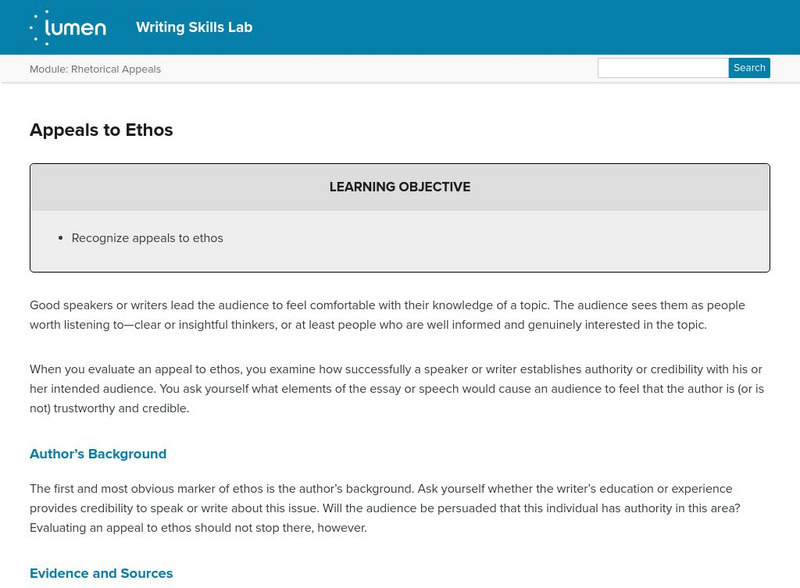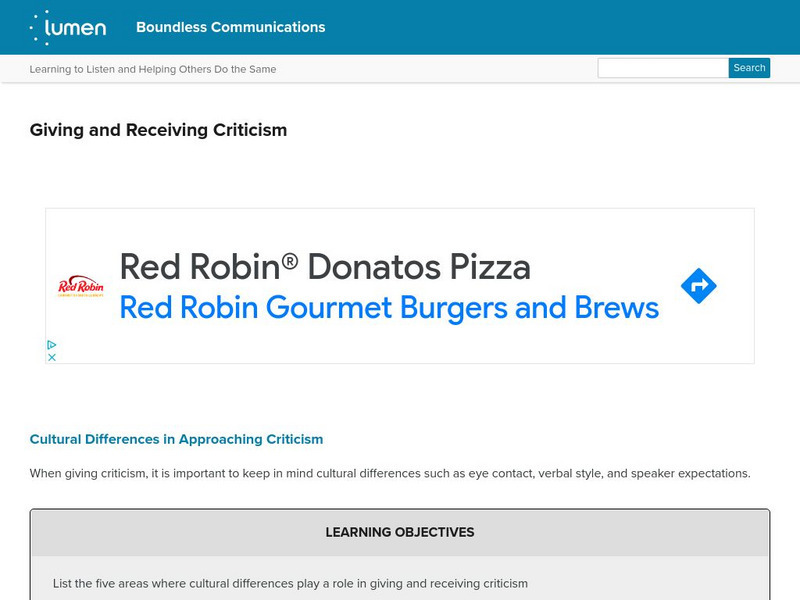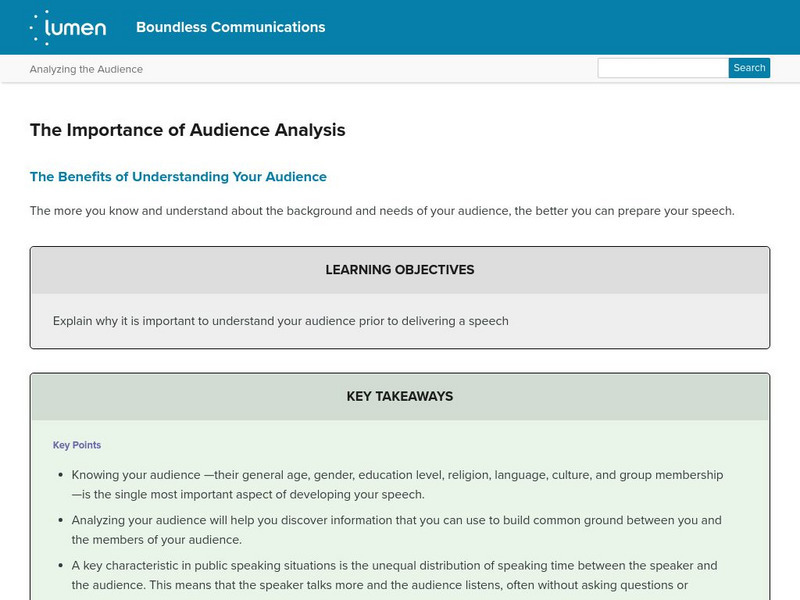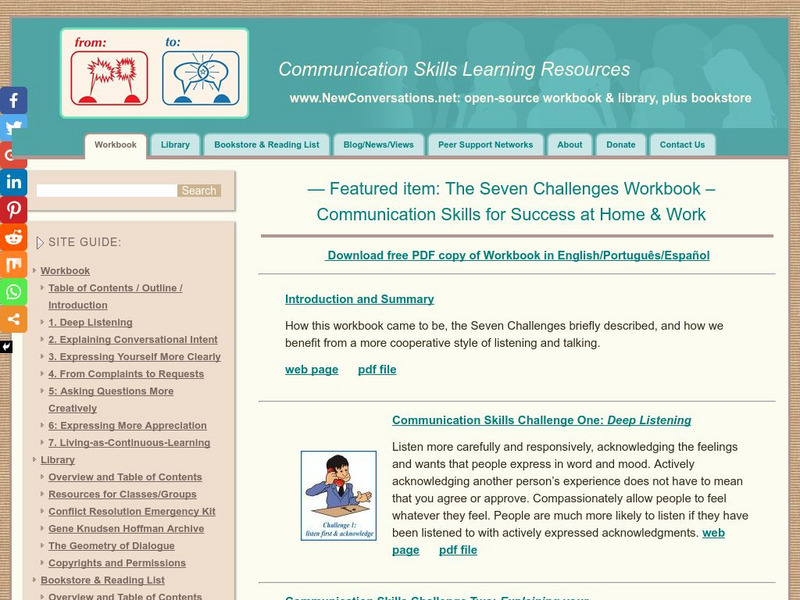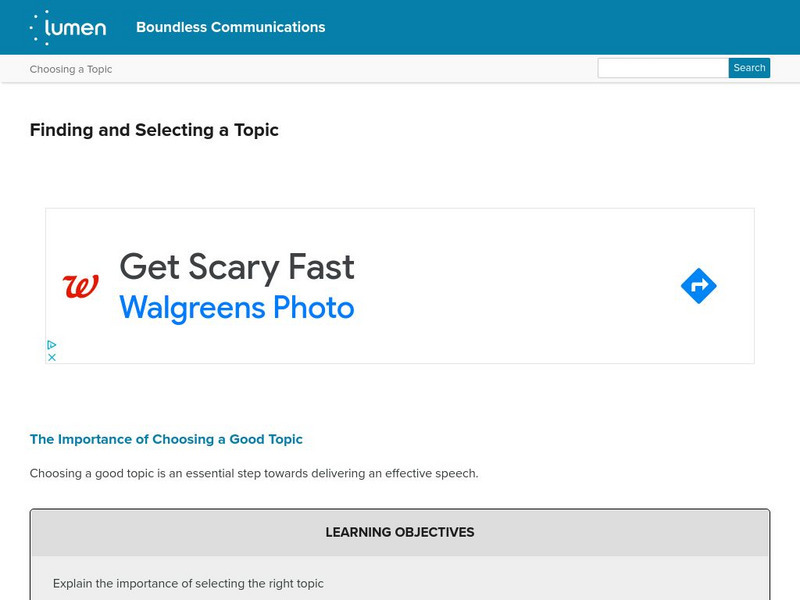Lumen Learning
Lumen: Boundless Communications: Managing Q&a
This lesson focuses on answering questions after or during an informative speech including how to prepare for Q&A by anticipating questions and practicing with a friend or colleague and methods of receiving and answering the questions.
Lumen Learning
Lumen: Writing Process: Selecting a Topic
This lesson focuses on selecting a writing topic including your approach to the assignment, understanding the assignment, purpose of the assignment, strategies for finding a topic, and how to narrow a topic to fit the scope and purpose...
Other
Self growth.com: Questioning Skills for Salespeople
The article deals with the difference between open-ended and closed questioning skills. Good questioning techniques can improve business.
Lumen Learning
Lumen: Rhetorical Appeals: Appeals to Ethos
This lesson plan focuses on appeals to Ethos, When you evaluate an appeal to ethos, how successfully a speaker or writer establishes authority or credibility with his or her intended audience. You ask yourself what elements of the essay...
Lumen Learning
Lumen: Rhetorical Appeals: Establishing Ethos
This lesson focuses on establishing ethos or credibility. You can establish ethos-or credibility-in two basic ways: you can use or build your own credibility on a topic, or you can use credible sources, which, in turn, builds your...
Lumen Learning
Lumen: Writing Skills: Introduction to Building Common Ground
This introduction discusses the need for researching your audience and learn strategies to find common ground.
Lumen Learning
Lumen: Writing Skills: Formula for Refutation and Rebuttal
This lesson focuses on the formula for refuting and rebutting counterarguments including accurately representing opposing viewpoints, using a respectful, non-incendiary tone, using reliable information, using qualifying words to aid...
Lumen Learning
Lumen: Critical Reading: Logic and Structure
This lesson focuses on structure and logic including types and purposes of essays, organizational patterns, argumentative writing, and logic and fallacies.
Lumen Learning
Lumen: Boundless Communications: Giving and Receiving Criticism
This site provides three links on the topic of giving and receiving criticism. They are as follows: Cultural differences in approaching criticism; Be positive, specific, objective, and constructive; and techniques for accepting...
Lumen Learning
Lumen: Boundless Communications: Contextual Factors to Consider
In this Boundless Communication presentation, students will learn about contexts to consider when preparing a speech including physical, the psychology of audience, audience opinion of you and topic, and audience knowledge of the topic.
Lumen Learning
Lumen: Boundless Communications: The Importance of Audience Analysis
The first question you should ask yourself, before you begin crafting your speech, is this: "Who is my audience?" As you begin to answer this question for yourself, here are some key elements to consider as you begin to outline and...
Other
New Converstations: Seven Challenges Workbook: Communication Skills for Success
Extensive online tutorial from Cooperative Communication Skills on interpersonal communication, covering listening, conversational intent, expressing yourself clearly, asking questions, expressing appreciation, and incorporating better...
Edutopia
Edutopia: Establishing a Culture of Questioning
This article discusses establishing a culture of questioning. When students consistently ask meaningful questions, they get comfortable taking the risks that lead to learning. SL.11-12.1c Questions/Part
McGraw Hill
Mc Graw Hill: Carol's Classroom: Speaking and Listening: Prepare for Discussions
This video lesson [4:11] focuses on clear communication and active listening, essential social-emotional skills, that help lay the foundation of positive learning environments. They can develop these skills and take responsibility for...
Lumen Learning
Lumen: Boundless Communications: Finding and Selecting a Topic
This site provides five links to help students select a topic: The importance of choosing a good topic, your areas of expertise, your areas of interest, brainstorming, and scoping your topic.
Wisc-Online
Wisc Online: Barriers to Effective Listening
Learn about the 7 barriers to effective listening and test yourself at the end. Of which barriers are you guilty?
Kidsource OnLine
Kidsource: How Can Parents Model Good Listening Skills?
Good listening guidelines that parents can model for their children. Also includes suggestions for communicating with children.
CommonLit
Common Lit: Text Sets: Argument, Bias, and Persuasion
Collection of 43 Grade-Leveled texts (6-12)on the topic Argument, Bias, and Persuasion. Have students track arguments through texts as they examine logical reasoning, bias, and persuasive techniques such as emotional appeals, character...
Love To Know Media
Your Dictionary: Examples of Open Ended and Closed Ended Questions
Explains the difference between open and closed questions. Gives examples and situations where each might be used.
Other
Splendid Speaking
Podcasts for advanced English Language Learners who can listen to non-Native speakers having conversations and carrying out short tasks. Examples include Working Together to Reach Agreement, Responding to Questions, and Taking Part in...
Alabama Learning Exchange
Alex: Writing a Persuasive Essay
In this lesson students research opposing viewpoints on controversial issues and develop their own position papers. Though primarily for English classes, this lesson could be easily adapted for an interdisciplinary unit with social...
Other
Jewish World Review: Stating the Obvious
Is empathic listening so obvious as to be moronic? Does it work? Here's a dissenting viewpoint of some of the more popular listening, communication, and interpersonal relationship theories.
Other
Artemis: Using the Net for Team Communication
This site lists some ways and provides some tips for teams to use while communicating in a virtual setting.
Other
Ed u.com: Three Fundamentals of Selling Your Message
This site is provided for by Ed-U.com. Based on the Greek ideas of ethos, logos, and pathos the writer addresses how to adequately persuade an audience.


